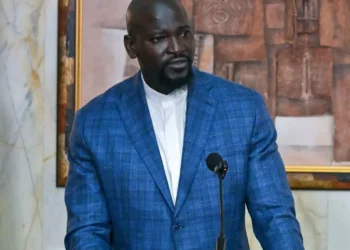Ghana’s film industry has long been an important vehicle for cultural expression, from the on-screen legacies of the past to the vibrant, fast-moving local productions of recent decades.
Yet despite talent, energy, and clear demand, the industry struggles with low budgets, weak distribution, piracy, and uneven production values. Many industry observers and practitioners now call for a renewed focus on storytelling as the fulcrum of revival.
This is not nostalgia for “better scripts” alone; it is a strategic argument: excellent stories generate audiences, revenues, critical attention, and investor confidence — and they do so even as production infrastructure improves.
Actor Adjetey Anang has called for stronger storytelling to revive Ghana’s film industry, which he describes as a flame that has dimmed but not gone out.
In a video shared on social media, he said the industry still has abundant talent and content. Still, filmmakers must focus on quality to attract both local and international audiences.
“We have the gift and talent, and content necessary to succeed. While capital is important, a strong storyline can still carry a film even if we don’t have huge financial backing.”
Adjetey Anang
He noted that many producers struggle to recover costs, especially after sharing revenue with major cinema outlets like Silverbird.
To address this, he called for more movie centres across the country to reduce monopoly, create competition, and open opportunities for filmmakers.

Audiences return for meaning and emotional connection. Technical polish attracts initial attention, but a weak script loses viewers and stunts word-of-mouth.
Films with memorable characters, fresh perspectives, and culturally specific yet universal themes create fanbases, inspire repeat viewings, and encourage social conversation — vital ingredients for a vibrant local box office and export potential.
Nollywood’s volume and star system dominate the West African market. Ghana’s competitive advantage lies in unique cultural histories, folklore (e.g., Anansi tales), regional languages, and untold contemporary stories about migration, urban life, and postcolonial memory.
Films that foreground Ghanaian specificity — told with narrative clarity and emotional depth — can carve distinct niches at home and abroad.
Encourage adaptations of Ghanaian literature, oral histories, and folklore, paying careful attention to rights and respectful representation helps strengthen storytelling.
Use successful Ghana-shot projects (e.g., internationally recognized productions filmed in Ghana) as case studies to attract skilled crew and story development partners.
Films that made an impact internationally did so because of voice and story: Ghanaian auteur-driven works that won festival notice and streaming deals succeeded on the strength of their narratives and aesthetics, proving that Ghanaian stories travel when well told.
Conversely, projects that prioritized speed or gimmicks over script quality often failed to build long-term audiences or critical recognition.
A Call To Action

Reviving Ghana’s film industry will not happen overnight.
It requires a coordinated effort: filmmakers must prioritize development and storytelling, funders must commit resources to scripts rather than only production equipment, educators must train a new generation of writers, and policymakers must create incentives that reward narrative excellence.
The private sector, cultural institutions, and the diaspora all have roles to play in providing funding, mentorship, and distribution channels. Streaming services and international partners amplify Ghanaian voices — but those voices must first be grounded in compelling, well-crafted stories.
Beyond funding, Adjetey Anang stressed that the industry must also improve its craft.
He urged scriptwriters and producers to put more research into their work, pointing out that the rise of digital platforms means Ghanaian movies now have the potential to reach global audiences instantly.
“We need to focus on improving the quality of our work by putting more research into our projects. Once something is released, it can reach a global audience. These are some of the challenges that make it seem like the industry is struggling, but we are still pushing.”
Adjetey Anang
Ghana has an abundance of stories — of history, folklore, resilience, and modern life — that are waiting to be translated into cinema with global appeal.
By putting storytelling at the center of revival efforts, Ghana builds a film industry that not only entertains but also strengthens national identity, creates jobs, and earns cultural export revenue.
Strong stories are the multiplier: with them, technical upgrades, funding, and distribution will follow. The time to invest in narrative craft is now.



















